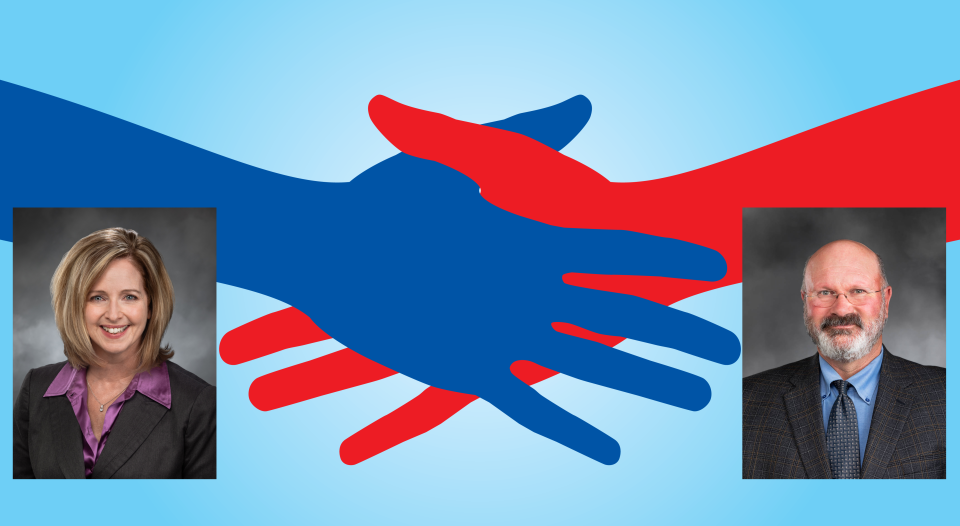I recently moved to Minnesota, a state famous for its niceness, yet even here the dam is crumbling against the force of the River Bile. As the Minneapolis Star-Tribune recently reported, the growing incivility of political activists and elected officials on the national level has begun filtering down to local government, infecting school boards and city councils.
In Rochester a council member was ejected from a meeting and is suing the city, the mayor and another council member. In Brooklyn Park a council member was thrown out of a meeting, claimed that she was being bullied by the mayor and other colleagues, and refused to attend any more sessions. In Minneapolis a city council committee meeting on homelessness devolved into sniping between a council member and the committee chair, who ultimately adjourned the meeting. “Wah wah wah,” the aggrieved council member told the chair, “I got a tiny violin for you.”
Commentators offer different explanations for this ongoing breakdown in civility, blaming the hyperpartisanship of U.S. politics, the erosion of the social contract during the worst months of the COVID-19 pandemic, and the emotional disconnection of people who live and work online. Regardless of the reason, civil discourse in the United States is gradually unraveling into civil disorder, as evidenced by the events of Jan. 6, 2021, and the July 13 assassination attempt against former President Donald Trump.
The ELCA has been much concerned with its role in promoting a healthy civil society, first producing the 2020 social message “Government and Civic Engagement in the United States: Discipleship in a Democracy” and now soliciting public comment on a forthcoming social statement on civic life and faith, which will be considered for adoption by the 2025 Churchwide Assembly. (You can read the draft statement here and leave your feedback here through Sept. 30). The latter document explicitly criticizes the current political climate, and it calls on the church to foster more humane discussion in the public square.
The proposed statement anchors its arguments in the virtue of humility, citing Micah 6:8 (“What does the Lord require of you but to do justice and to love kindness and to walk humbly with your God?”) but cautioning readers that “while we are called to do justice and love kindness … it is not always clear what that means in any particular situation” (page 17). With that in mind, it observes, walking humbly with God “must include welcoming and acknowledging the ideas, values, and contributions of all people, regardless of their religious tradition or worldview” (page 18).
More pointedly, the draft statement summons the church and its people to take responsibility for encouraging positive and productive debate:
This church has a responsibility, working with all people of goodwill, to mediate conflict and to advocate just and peaceful resolutions while supporting institutions and policies that seek the well-being and power of all. … Because we recognize that every person is one for whom Christ died, we must seek to be a safe space for challenging conversations. A safe space does not mean a space where all agree; it means a space where all are honored and valued regardless of what they believe (page 22).
“Having the respect for the other person, having the patience to sit and listen is incredibly important.”
“My wife is constantly reminding everyone, ‘Just … be … nice,’” said Washington state Sen. Ron Muzzall, a member of Oak Harbor (Wash.) Lutheran Church. “You don’t have to be confrontational to get your point across, you don’t always have to be right. You don’t always have to get in an argument over something or another.”
A Republican, Muzzall represents the 10th District and serves as assistant ranking member on the Health & Long Term Care Committee, among other posts. Recently he’s been speaking out on the importance of civility in politics alongside state Sen. Annette Cleveland, chair of that committee, who is a Democrat, represents the 49th District and attends Beautiful Savior Lutheran Church in Vancouver, Wash.
When I spoke with the senators, on an early-morning conference call in late April, I asked how their faith had informed their ideas on civility. “Grace,” Muzzall replied. “We are saved through grace, and we’re expected to act with grace.” That grace, he pointed out, comprises “a number of things, including forgiveness and respect.”
“I agree wholeheartedly with what Sen. Muzzall said,” Cleveland added. “I believe that my faith helps me to approach problems always from a standpoint of love, always from a place of love and not hate. What spurred me to want to be more involved in attempting to promote more civil discourse is really my concern that many of the different advocacy groups I work with tend to be taking the tack that they’re going to begin from a place of hate.”
“I believe that my faith helps me to approach problems always from a standpoint of love, always from a place of love and not hate.”
The two senators come from different walks of life, one tinted blue, the other red. Muzzall grew up in Oak Harbor, a small city on Whidbey Island in the northwestern part of the state, where he is a managing partner of 3 Sisters Family Farm and, with his wife, Shelly, manages the 3 Sisters Market. Before running for the state Legislature, he spent 30 years on corporate boards for farming co-ops, including the Land O’Lakes Cooperative. By contrast, Cleveland was raised in Vancouver, which lies along the Washington-Oregon border and is part of the Portland metropolitan area; she has lived on the East and West coasts and worked in government affairs and in strategic planning, most recently for the health and transportation sectors.
Despite those differences, the senators are cordial toward each other. Their job in the Senate, they stressed, is not to move political footballs up and down the field but to find genuine consensus that produces strong, enduring legislation. That sort of consensus can emerge, they maintain, only when the parties involved acknowledge each other’s human dignity.
“Having the respect for the other person, having the patience to sit and listen is incredibly important,” Muzzall said. “I’ve gone through some really difficult times in church governance, and sometimes it’s cost us members, because we had to make tough decisions. Well, that’s the same thing in our state governance. We’ve got to listen, we’ve got to figure out what our commonalities are, and we’ve got to come together to solve these issues.”
Both legislators have made the point that part of championing civility is refusing to tolerate incivility. Speaking last year to the organization Civility First, Cleveland remembered a formative experience, just after she joined the Legislature in 2013, when a “stakeholder group” reacted to her committee vote by putting out a hit piece. She phoned the organization to ask why it hadn’t reached out to her before the vote.
At the same time she points out that “conflict is what moves us forward.” I asked her to elaborate on this statement. “I think that diversity of opinion and listening to other points of view is what allows us to see things in new ways,” she replied. “It allows us to grow, it allows us to learn, and it’s what truly ensures that we have the strongest policies possible at the end of the day. … I have been involved in politics for a very long while—my dad actually involved me, from the time I was young, in his activism and work—and I believe to my core that the only way to continue to move forward in a positive way is when we do so in a bipartisan fashion, when we work across the aisle.”
She and Muzzall agree that norms for civil behavior are shifting and that some constituents and stakeholders refuse to concede that they’re behaving badly.
“It’s become more normalized because of the groupthink that we seem to be getting into [in] our society,” said Muzzall. “If you don’t believe exactly what my group believes, then you’re marginalized, you’re outside. If you don’t believe, in my party, what the far right believes, then you’re a RINO, a Republican in Name Only.” He recalled a family member who was traumatized by online bullying after she expressed support for the “wrong” candidate in a city council race. “How do we reach a point where we have so little empathy for another human being that we treat them so horribly and then justify it?” he asked. “You know, they say the road to hell is paved with good intentions. I think it’s paved with justifications.”
Both legislators have made the point that part of championing civility is refusing to tolerate incivility.
“I see relationship-building as extremely integral to promoting civility,” Cleveland observed. “Unfortunately, I think social media—as well as other world events; the pandemic certainly—has made it much more difficult to have personal relationships and form strong bonds, and has made it easier to be less civil. If you don’t have that connection to someone … it’s much easier to see them in a negative light and maybe begin to attach names to them that you wouldn’t in person or if you had a closer relationship.”
Muzzall also blames traditional mass media for the current climate of incivility. “Our media, and I’m broadly speaking there, has reached a juncture where they concentrate on the worst in us,” he said. “It isn’t Sen. Cleveland and I who are often quoted in the media. It is those who are most vociferous and most extreme who are followed.”
Cleveland cited a recent effort by Denny Heck, lieutenant governor of Washington, to promote greater civility in the state Legislature. “The first learning from that effort was that we’ve lost sight of our common ground, and in addition to that, I think that there’s been a real loss of hope by so many. And yet, that’s where I see the nexus, truly, between faith and politics, or our work in the Legislature, is hope.”
Because I always concentrate on the worst in people, I asked them about abortion, hoping to ignite a vicious argument and secure a slam-bang ending for my story. But they are both politicians and, even at 9 in the morning, slipped out of this snare with quiet, carefully considered responses. They are unfailingly gracious.
“I don’t think there’s much of anybody that I prefer to have an interview with besides Sen. Cleveland,” Muzzall said as we were wrapping up the call. “I have a tremendous amount of respect for her and her experience, and how she runs a committee. Serving together with her on that committee has given me a lot of respect for her views.”
“Right back at you, Sen. Muzzall!” Cleveland replied.





